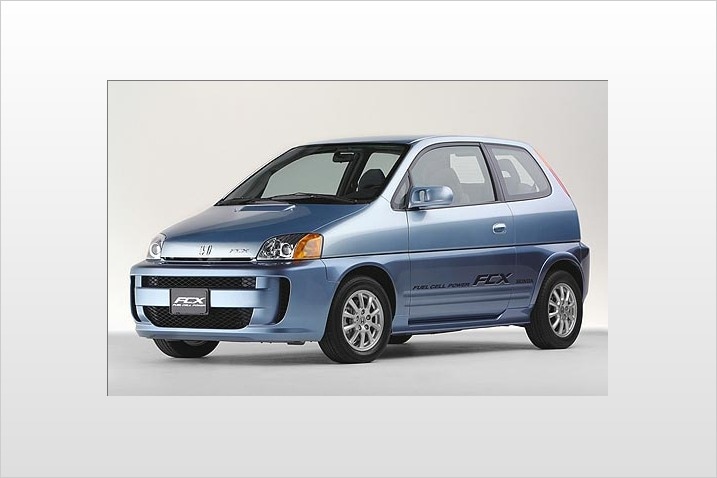But it's nowhere near the frustrating experience of driving battery-powered electric cars. Because of their severely limited range, it's nearly impossible to drive a car like GM's EV-1 like a regular car and still be guaranteed there's enough charge left to get home. The FCX's range is about 170 miles, which is about half of what most gasoline-fueled vehicles offer, but at least double that of traditional battery-powered electrics. And, if there's a place to get hydrogen, refueling the FCX only takes a few minutes — while it can take eight hours to refill the batteries in an EV-1.
With so much of the FCX's weight down low, it feels stable and corners with dignity. But it's not a sports car; the steering is uncommunicative and there's not a lot of traction — this is not a car that wants to go out and frolic. But it does ride well and it's spooky quiet, with almost no engine noise and the underfloor powertrain components damping out road and tire noise.
Hydrogen is — by far — the most abundant element in the universe, but it's usually connected to something else, so it takes energy to strip the hydrogen from, say, the oxygen atoms in water. In order for the whole system to remain non-polluting, the energy used to "crack" off the hydrogen must itself be non-polluting. Honda's fueling station behind its R&D facility in Torrance, Calif., does that with solar-generated electricity. But that takes up acreage, and the Honda Hydrogen station covers maybe a third of an acre and generates just enough hydrogen to fuel one FCX once a day. Hydrogen is also tough to transport in bulk, has to be stored under pressure and is generally more difficult to work with than traditional fuels. Can all these challenges be overcome? Probably. But maybe not. And no one knows when the breakthroughs are coming, or from where.
Beyond that, fuel cells are still very expensive. It costs Honda about $2 million to build an FCX and right now it has delivered only one, to the City of Los Angeles, on a $500-per-month lease (with all fuel and service included). Obviously, that price would come down with mass production, but even a $100,000 small, non-luxurious, non-performance car with limited utility isn't going to attract many buyers. If Honda gets the price down to that of a car like the Prius or Civic Hybrid, and comes up with a more useful package, hydrogen fuel cell cars may indeed be ready to come into the world — and turn it upside down.
